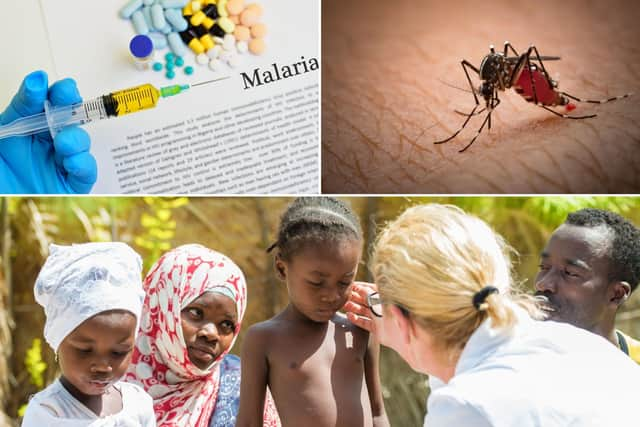Mosquirix vaccine: Who created the malaria vaccine and how does it work?
Malaria is responsible for 409,000 deaths each year, from roughly one million cases and mostly among babies and very young children.
94% of these cases are in Africa, according to the World Health Organisation (WHO).
Advertisement
Hide AdAdvertisement
Hide AdAs you can catch the disease multiple times, it often takes years of being repeatedly infected to build an immunity to protect you from being seriously ill with the disease.
Malaria is a parasite that is spread by the bite of blood-sucking mosquitoes. The parasite destroys our blood cells as it reproduces.
Attempts to protect against the disease so far have included drugs to kill the parasite, nets to prevent bites, and insecticides to kill the carrier mosquitoes.
Now, after years of research, a vaccine has been approved. Here’s all you need to know about the Mosquirix vaccine and how it works.
Is there a vaccine for malaria?


The vaccine for malaria, known as Mosquirix or RTS,S, was actually approved for the first time six years ago, after more than 100 years of searching by some of the world’s medical researchers.
It then underwent rigorous pilot immunisation programmes in Ghana, Kenya, and Malawi.
2.3 million doses were administered as part of these programmes and the results showed that not only was the vaccine safe, but it let to a 30% reduction in severe malaria.
The Mosquirix vaccine is also cost-effective, so it could reach more than two-thirds of children who don’t have a net to sleep under.
Advertisement
Hide AdAdvertisement
Hide AdAs a result, two expert advisory groups at the WHO approved the use of the vaccine on Wednesday October 6th.
"The long-awaited malaria vaccine for children is a breakthrough for science, child health and malaria control," Dr Tedros Adhanom Ghebreyesus, director-general of the WHO, said. "[It] could save tens of thousands of young lives each year."
Who created the malaria vaccine?
The Mosquirix vaccine was created by GlaxoSmithKline (GSK), a UK-based pharmaceutical company.
GSK researchers have been working on the vaccine for 30 years, in collaboration with global innovation team PATH and a network of African research centres.
The vaccine tackles the most common and most lethal type of malaria parasite, out of over 100 different forms, called Plasmodium falciparum.
The six-year pilot programmes were carried out in partnership with local African research centres and medical teams.
How will the malaria vaccine be rolled out?
A large part of the pilot programmes was to test whether the vaccine would work logistically, as well as medically.
The Mosquirix vaccine needs four doses for it to be effective, with the first three given a month apart at five, six, and seven months old.
Advertisement
Hide AdAdvertisement
Hide AdThe final dose is administered as a booster at around 18 months.
There were initial concerns that the need for several doses would make it impractical to administer on a large scale.
However, the pilots also revealed that there was no interference with other routine vaccines and measures to present malaria, making it a viable option for various parts of sub-Saharan Africa.
As a result, the vaccine will be rolled out across regions in Africa with moderate to high malaria transmission.
Comments
Want to join the conversation? Please or to comment on this article.